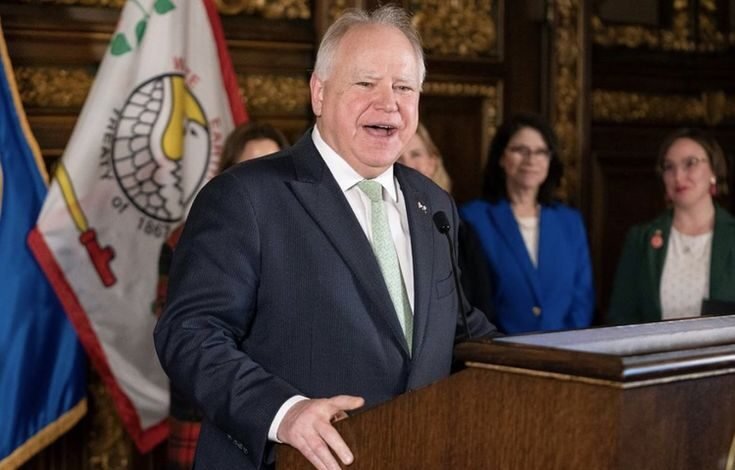Tim Walz’s Education Appointee Brian Lozenski Advocated Overthrowing the US
Tim Walz's Education Appointee Brian Lozenski Advocated Overthrowing the US

Introduction
The tim walz’s education appointee brian lozenski advocated overthrowing the us appointment of Brian Lozenski as an education appointee by Minnesota Governor Tim Walz has sparked heated debate over his suitability for such a crucial leadership role. Lozenski, an accomplished academic and advocate for equity in education, has come under scrutiny for his controversial past statements, including advocating for the overthrow of the U.S. government. This blog unpacks the controversy, examining Lozenski’s background, the statements that have fueled criticism, and what this means for the education sector.
Whether you’re a policymaker, educator, or simply someone invested in education reform, the insights below will help outline the key issues, public responses, and implications for future educational leadership in Minnesota and beyond.
Who Is Brian Lozenski?
Brian Lozenski is a respected educator, researcher, and equity advocate who has spent his career challenging inequities in education systems. He has long argued for more equitable access to learning resources and improved inclusion of marginalized communities in educational decision-making. Lozenski’s work often emphasizes the importance of decolonizing curricula and fostering systems where traditionally underserved students can thrive.
Before his appointment, Lozenski served as a professor at a leading Minnesota university, specializing in critical pedagogy and community-based knowledge systems. His academic contributions include research on systemic racism in education, which has earned him the respect of many in progressive education circles.
However, his outspoken stances on systemic change and criticisms of Western societal structures have also made him a polarizing figure. For many, he embodies a fresh approach to dismantling systemic inequities, while for others, his rhetoric has been perceived as too radical for a public education leadership role.
Advocacy and Controversy
At the heart of the debate are statements Lozenski has made criticizing foundational elements of American governance and advocating for societal restructuring. Perhaps the most inflammatory of these statements is his open advocacy for “overthrowing” existing systems in the U.S., which critics claim extends to dismantling the federal government itself.
Lozenski’s Perspective:
Lozenski has argued that the U.S. government operates on long-standing structures of colonialism and systemic racism. He believes these structures are deeply ingrained in education systems, perpetuating disparities that harm communities of color and low-income students. Through his academic and activist work, Lozenski has called for systemic overhauls to ensure equitable educational environments, tim walz’s education appointee brian lozenski advocated overthrowing the us
Lozenski has clarified that his call for “overthrowing” existing systems relates to dismantling oppressive structures—not inciting violence or promoting illegal acts. Instead, he envisions reimagining and reconstructing society to center justice and equity.
Criticism of His Views:
Opponents, including some educators, parents, and political figures, contend that Lozenski’s rhetoric undermines trust in public institutions, including the education system he would help oversee. They argue that advocating for radical systemic changes may alienate stakeholders and create divisions within the education community.
Furthermore, critics see Lozenski’s appointment as a misstep by Governor Walz, alleging that it prioritizes ideology over qualifications and pragmatism. For some, Lozenski’s views symbolize a broader trend of politicizing key education positions.
Public and Expert Reactions
Diverse Opinions from the Public
Public response to Lozenski’s appointment has been deeply divided.
- Supporters view Lozenski as a bold and courageous advocate for equity who can address longstanding injustices in education. They see his appointment as a much-needed shift toward amplifying marginalized voices.
- Critics accuse him of being too radical for an educational leadership position. They question whether someone with what they perceive as “anti-American” rhetoric can objectively serve the diverse needs of Minnesota’s students and parents.
Education Experts’ Take
Many education experts hold nuanced perspectives on Lozenski’s appointment.
- Some applaud his focus on decolonizing curricula and prioritizing equity, citing the need for leadership that addresses the root causes of systemic disparity.
- Others worry about how his perceived radicalism will impact the public’s trust in education leadership. Concerns over politicization, stakeholder buy-in, and the feasibility of his proposed changes remain central to the debate.
The Future of Education
Broader Implications for Education Leadership
The controversy surrounding Lozenski raises larger questions about the qualities and qualifications expected of education leaders in today’s polarized climate.
- The Line Between Advocacy and Governance
Advocates like Lozenski often bring fresh ideas to the table, but their influence is limited if these ideas polarize key stakeholders. Striking a balance between radical critique and actionable, inclusive policymaking is vital.
- Public Trust and Accountability
Educational leadership is about more than advancing an agenda—it requires maintaining public trust, which can be eroded when leaders’ statements alienate parts of the community. Appointees must demonstrate accountability and openness to all perspectives to garner widespread support.
- Transparency in Appointments
Tim Walz’s appointment of Lozenski highlights the importance of transparency and vetting in political and administrative decisions. By adequately preparing the public for appointees with unconventional viewpoints, governments can help manage expectations and foster productive dialogue.
Key Questions for the Future
- How can education systems balance advocacy for systemic change with the need for pragmatism and inclusivity?
- What role should public opinion play in shaping appointments for key education leadership roles?
- How can policymakers address community concerns while advancing bold reforms?
Why Education Stakeholders Should Pay Attention
The outcomes of controversies like Lozenski’s appointment could shape the direction of education policy and leadership for years to come. For anyone invested in the future of education—whether as a parent, educator, or policymaker—it’s essential to consider how the tensions between innovation, advocacy, and public trust will influence the system as a whole.
A Call for Transparent and Inclusive Decision-Making
The appointment of Brian Lozenski by Tim Walz has undoubtedly ignited meaningful conversations about education, equity, and leadership. While opinions on Lozenski’s suitability remain polarized, what’s clear is the pressing need for transparency, dialogue, and accountability in educational decision-making.
If you’d like to stay informed on the latest developments in education policy—or learn more about tackling systemic challenges in education —be sure to follow our blog for expert insights and updates tim walz’s education appointee brian lozenski advocated overthrowing the us.



